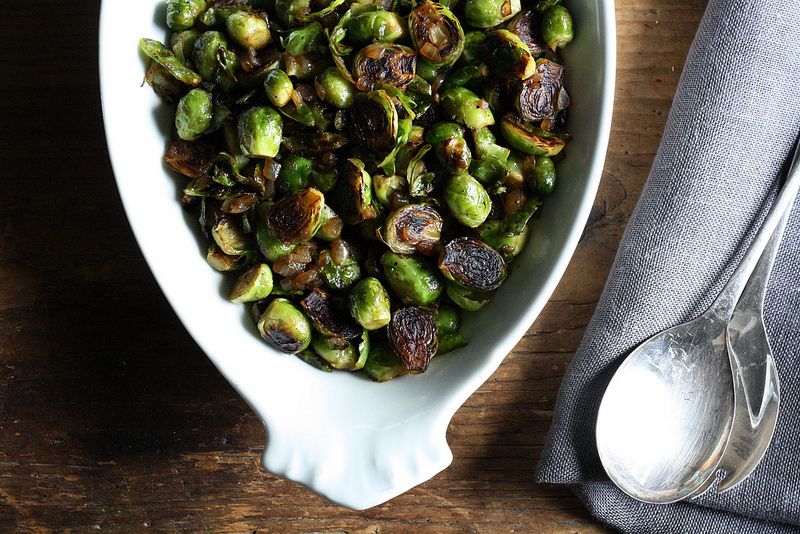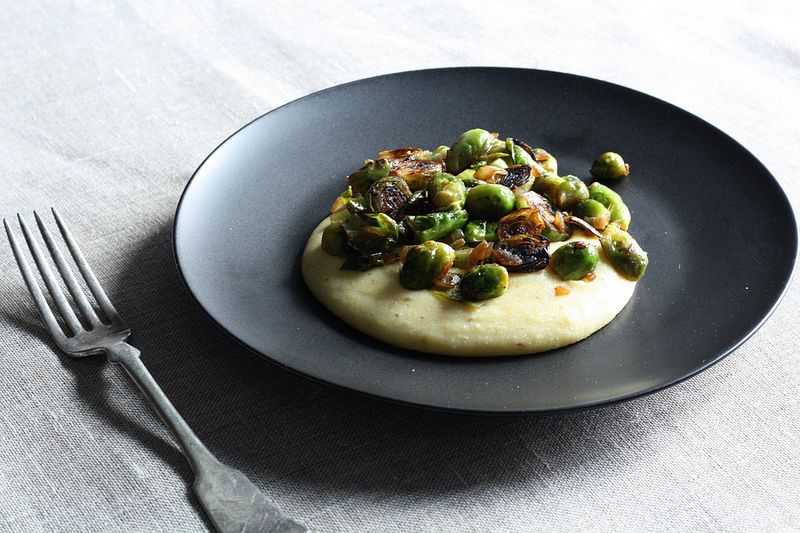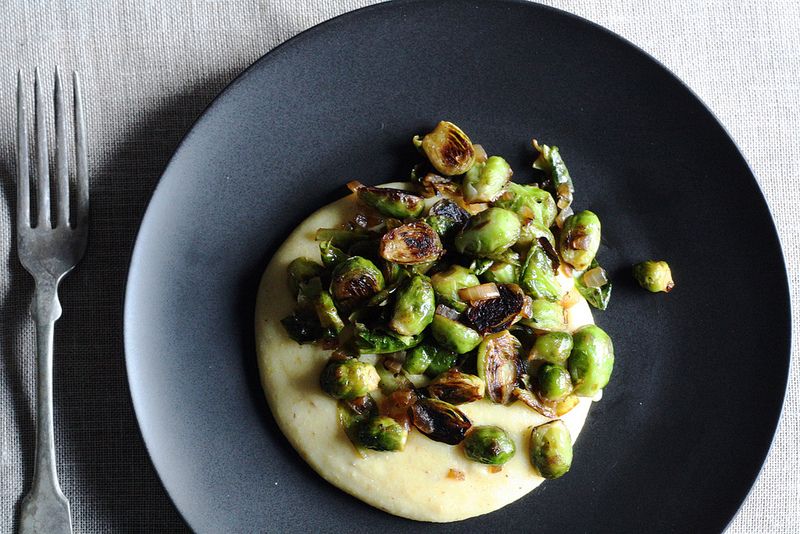52 Days of Thanksgiving

52 Days of Thanksgiving
Top-notch recipes, expert tips, and all the tools to pull off the year’s most memorable feast.
Check It OutPopular on Food52
18 Comments
Ella
October 30, 2013
Call me a Philistine, but I microwave my Brussel sprouts! I score them on the base end as if I were cutting them into quarters, but do not cut clear through. Then I microwave them for a few minutes with just a little moisture till barely tender. Then I add butter and/or olive oil and balsamic vinegar. I think they are great. And it is so easy too.
AntoniaJames
October 22, 2013
I did a side-by-side comparison, parboiling half (and I actually cut each Brussels sprout in half, putting one half in one pile and the other in the second pile) and for the rest, using my favorite secret weapon for eggplant and zucchini, which can leave a bitter aftertaste: I brine them, cut, for 5 - 10 minutes before cooking. (This is a tip I first read about, years ago, in my ancient -- circa 1941 -- edition of The Joy of Cooking. I cannot remember for which vegetable Mrs. Rombauer suggests brining (in fact, it may be Brussels sprouts!), but I do know that the light salt water bath works miracles on the structural integrity of eggplant while cooking, and is a lot easier/reliable than salting and draining. But I digress.) The end result: brining produced a sweeter cooked Brussels sprout, and is easier, than parboiling. ;o)
mrslarkin
October 23, 2013
AJ, your note reminded me of a great video from Fudehouse on brining tomatoes. The technique is pretty brilliant, and I bet can be adapted for any veggie, including Brussels sprouts. Here is the link: http://fudehouse.com/post/63648742917 I have a tub of sprouts that I am going to experiment with soon. Will report back!
AntoniaJames
October 24, 2013
This is so interesting! It explains why eggplant and zucchini in particular, when brined, have a much more appealing texture than when simply salted and drained. I've always assumed that's because brining distributes the salt more evenly than sprinkling on dry salt, but obviously, drawing moisture out of the vegetables affects its structural integrity. The Brussels sprouts that were brined, by the way, seemed juicier than the ones that were parboiled; they're certainly much juicier than ones I've roasted without brining. I wonder why brining has not caught on? It's not that hard! It's actually easier, to my mind, than salting and draining, and, of course, parboiling. In all fairness, however, the Brussels sprouts I tested -- like those used by the Food52 test kitchen -- were fairly small. But actually, that should not make any difference, given that they recommend cutting the larger ones in quarters. ;o) P.S. I went back to my old, tattered, beautiful early-1940's Joy and it is Brussels sprouts that Mrs. Rombauer instructs us to brine. ;o)
mrslarkin
October 26, 2013
I brined my sprouts and they came out delicious! Meant to brine them for 30 minutes, but forgot them, so all in all i think they were in the brine for 1 hr.
AntoniaJames
October 22, 2013
This article says that you quarter the Brussels sprouts to get more surface area, and yet the photos suggest that you cut them in half. Are my eyes playing tricks? ;o)
Marian B.
October 23, 2013
Good eye! The brussels pictured were so teeny tiny that we decided to keep them halved, but I like them best with medium-sized sprouts that are quartered. They're great either way.
mrslarkin
October 16, 2013
I LOVE THAT COOKBOOK! I searched the book from cover to cover and couldn't find where she talks about the "pot-stuck" method, other than the little drawing on the inside cover. Is it anywhere else in the book? Also, I do my cauliflower pretty much this way, by steaming it first. Comes out awesome, with crunchy crisp tasty parts. Thanks for the recipe, Marian.
Kenzi W.
October 16, 2013
Love the idea to apply this technique to more than just brussels. (But I'll be cooking these sprouts until I really cannot eat another...)
Marian B.
October 16, 2013
In the book they're called Smoky Brussels Sprouts! She uses more spices and less oil (I'm a lush). Now I need to try that cauliflower!!
pierino
October 16, 2013
I'm totally down with the parboil method as the first step. But if you search for the tiniest ones you can find it's not always necessary, like if you buy ones no bigger than your thumb nail (or smaller). I guess I still have some trouble understanding the American aversion toward bitterness in vegetables. It's actually relished in Mediterranean countries---just that sharpness which you can't completely rectify with lemon juice. Does this go back to Plymouth Rock and a bunch of sour faced guys in silly hats? The German migration to the Midwest? Remember when Dan Quayle was objecting to American farmers turning to growing Belgium endive as a source of income? Apparently because it was an insidious foreign thing. And of course Brussels is in...
Kristen M.
October 16, 2013
These babies combine everything I love about buttery sauteed and crispy roasted brussels sprouts. I'm willing to parboil for that!
fiveandspice
October 16, 2013
The blackened cut faces are so key to Brussels sprouts. I've always felt the same way about parboiling, but 30 seconds may be something I could handle.
Marian B.
October 16, 2013
It totally is. Bonus: If you use a pot with a built-in strainer, you can boil an egg in the water once you're done. Efficiency!!




See what other Food52 readers are saying.